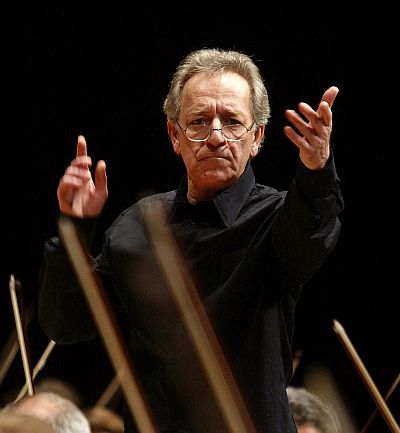 United Kingdom Liadov, Tchaikovsky, Shostakovich: Leticia Moreno (violin), St. Petersburg Philharmonic Orchestra /Yuri Temirkanov (conductor), Bridgewater Hall, Manchester, 4.11.2014 (MC)
United Kingdom Liadov, Tchaikovsky, Shostakovich: Leticia Moreno (violin), St. Petersburg Philharmonic Orchestra /Yuri Temirkanov (conductor), Bridgewater Hall, Manchester, 4.11.2014 (MC)

Liadov: Kikimora, Op. 63
Tchaikovsky: Violin Concerto in D major, Op. 35
Shostakovich: Symphony No. 10 in E major, Op. 93
Each season I look forward to the Bridgewater Hall, International Concert Series and especially enjoy the opportunity of hearing visiting Russian Orchestras. I was at the Bridgewater Hall in April 2012 when the St. Petersburg Philharmonic Orchestra performed an all-Russian concert under Yuri Temirkanov with pianist Dmitri Alexeev. In the last few years both at the Bridgewater and on my travels I have heard most of the Russian orchestras and some of them maintain an individual ‘Russian’ sound that I recognised for its predominantly dark hued colouring rooted in the low strings, the distinctive reedy woodwind and its blazing brass.
It didn’t take long to realise that the St. Petersburg Philharmonic, founded back in 1882, has developed a rather homogenised international sound. This is really not surprising when you think that the orchestra has had Maestro Temirkanov as its music director and chief conductor for twenty-six years, a maestro who has worked for many years internationally with the world’s finest orchestras and continues to do so. Unquestionably Maestro Temirkanov will have soaked up many different styles of orchestral sound which will have filtered back to his beloved St. Petersburg Philharmonic.
Tonight at the Bridgewater Hall Temirkanov and his St. Petersburg orchestra elected to play a programme of works by Russian composers Liadov, Tchaikovsky and Shostakovich, works they will know intimately. Lasting a mere seven minutes the orchestral appetiser to open the concert was Liadov’s miniature tone poem Kikimora. It’s a musical depiction of a Russian fairy tale concerning the witch Kikimora who has been raised up in the mountains from childhood by a magician. Undemanding and appealing the score is a brilliant essay in atmospheric orchestral textures.
Next came one of the best known concertos in the repertoire Tchaikovsky’s Violin Concerto an enduring audience favourite. It has been a while since I heard the Tchaikovsky concerto and was excited at the prospect of Spanish soloist Leticia Moreno performing the score. My enthusiasm soon waned as this turned out to be a lacklustre performance of this great concerto. Soloist Moreno has a small sound and was soon swamped by the orchestra and maybe Maestro Temirkanov can take some responsibity for this. Noticeably lacking in passion and bite Moreno’s interpretation never caught fire with her articulation seeming heavy and phrasing short of clarity as if not being able to feel the emotion in the music. A few weeks ago I heard Viktoria Mullova play a Russian violin concerto in this very hall, a soloist who was able to bring effortless virtuosity and real artistry – everything this performance was lacking.
The main work of the evening was Shostakovich’s Symphony No. 10 a score written in the months following the death of Joseph Stalin the leader of the Soviet Union and a few years after the anti-formalist purges of 1948 which must have still stung. It’s said that the Allegro movement is a portrait in music of Stalin and the symphony as a whole seems to be a biting response to the condemnation the composer had suffered. Maestro Temirkanov had full measure of the shape of the score which he must have played so many times over the years. Yet there was no sense of the workaday this was a persuasive, characterful and intensely serious performance revealing much vivid detail. I especially admired the tension filled Allegro (the so-called depiction of Stalin) which contrasted savagery and menace with sardonic jubilance. Always intriguing the Allegretto movement felt like a haunted ballroom with some chilling sounds that were often folk-like and at other times militaristic. The chorus of horns played wonderfully and considerable praise is due to the principal horn for his exquisite playing. Maintaining such a tremendous level of concentration and intensity for nearly an hour the Philharmonic must have been exhausted but it didn’t affect the quality of the playing which was compelling right up to the final bars. Maestro Temirkanov’s performance took the audience on a journey that was both thrilling and dramatic.
Michael Cookson